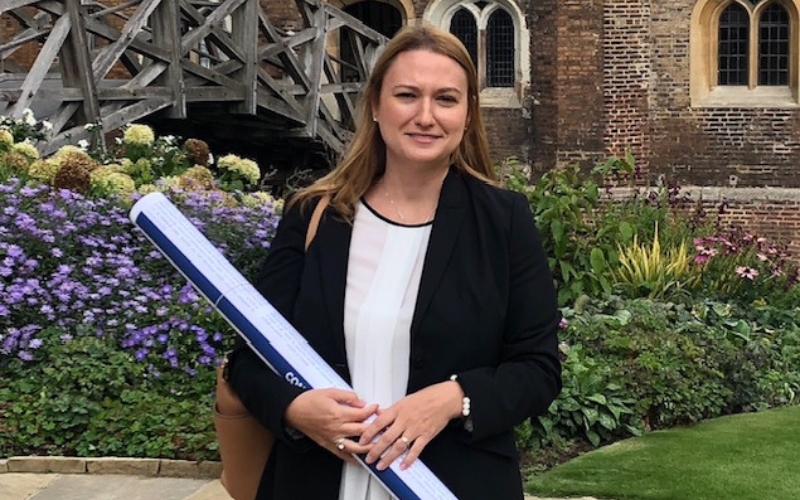Can you please tell me when and how you came to know Father Stanley Jaki and his work?
I first became acquainted with Fr. Jaki’s books in 2004 through Prof. Julio Gonzalo, a Full Professor of Physics at the University UAM of Madrid and President of the Spanish Association for Science and Culture, and in 2005, I had the opportunity to meet him in person when he visited Madrid at Prof. Julio’s invitation to deliver a lecture at San Pablo CEU University. At the time, I was a professor of Bioethics at the university and accompanied Prof. Julio Gonzalo to the airport to pick him up. We had the opportunity to converse during the several days he stayed in Madrid. During his visits to Madrid, Fr. Jaki always enjoyed going to the Benedictine Abbey of El Valle de los Caídos to pray, and on this occasion, we accompanied him there. We also attended his lecture, discussing it afterwards. When we were taking him to the airport for his return to the United States, he was already considering the possibility of establishing a collaboration on topics related to science and faith as an apostolate for Catholic university students.
What would you highlight from Jaki’s work that you consider to be very relevant in today’s world?
I would highlight how Fr. Jaki brilliantly demonstrates the Christian origins of science, showing that science developed within Christendom for specific reasons and not by mere coincidence. His dedication to seeking the truth and recording it in his books makes his work highly relevant today. In a world often marked by superficial narratives, his clear analysis reminds us of the profound connection between faith, reason, and the advancement of knowledge. His books have brought many people closer to the faith, opening the way to God’s grace and serving as an instrument for their conversion to Catholicism.
What do you think is the reason why Jaki is being rediscovered today?
Today, more than ever, people listen to scientists because science is one of the most respected realms of understanding, and many seek evidence to bring them closer to faith. Even more, they value a wise scientist. Fr. Jaki is not just a theologian who studied science; he earned a doctorate in physics, along with doctorates in theology and philosophy, which gives his perspective significant weight. Reading Jaki means engaging with his synthesis of great thinkers, approached from the standpoint of someone who defends the Catholic Church, seeks to evangelize through his writings, and offers a critical testimony to the truth. His writing style, the way he connects ideas, his clarity, and wisdom can contribute to a desire to rediscover his work, which is vast and encompasses many diverse topics.
How is your research area related to Jaki’s work?
When I met Fr. Jaki, I was conducting research on bioethics as part of my dissertation for the Master’s in Bioethics and Biolaw from UNESCO. My research focused on the side effects of ovarian hyperstimulation treatments, particularly in young donors who were not signing informed consent forms, were unaware of the adverse effects, and repeatedly underwent these procedures. In many cases, these practices were harmful due to the donors’ young age and the lack of adequate oversight, in addition to the significant bioethical dilemmas they raised. As a result of the conversations I had with Father Stanley Jaki in 2005, he expanded the edition of his book ‘The Ethical Foundations of Bioethics’ and asked me to translate it into Spanish. He personally supervised the layout of the book, and it was reviewed by Prof. Julio Gonzalo (Full Professor of Physics and president of the Spanish Science and Culture Association), whom he asked to oversee its publication in Spanish. I also have pending work to complete Spanish translations of several of Jaki’s other books, such as “The Drama of Guadalupe”, “Brain, Mind and Computers”, “The Good Samaritan” and “Chesterton, a Seer of Science”. I also had the opportunity to collaborate with him on conferences, co-authoring a joint paper titled “Pragmatism Then and Now”.
Lucía Guerra Menéndez holds a degree in Pharmacy (2004) and an MBA (2004-2005), alongside grant-supported participation in invited oral communications on Science and Religion at the University of Pennsylvania (2005-2008). She completed a Master’s Degree in Bioethics and Biolaw and doctoral courses at UNESCO’s Chair of Bioethics and Biolaw (2005-2007), while also teaching Bioethics at CEU San Pablo University. In 2007, she joined the Physiology Department at the Medical School as a Lecturer. She earned a Master’s Degree in Molecular Applied Medicine, specializing in Oxidative Damage and Bioprotection (2010), and a PhD in Physiology with Summa Cum Laude honors in 2012. She has published 32 articles (14 JCR-indexed) and supervised 23 degree projects. She has presented research at national and international conferences in different countries and engages with the relationship between science and faith based on Fr. Jaki´s works. She is a member of the British Society of Cardiovascular Research since 2017 and member of the British Atherosclerosis Society since 2018, as well as member of the Spanish Association of Science and Culture since 2004. Since 2007, she has been an Associate Professor at CEU San Pablo University.
